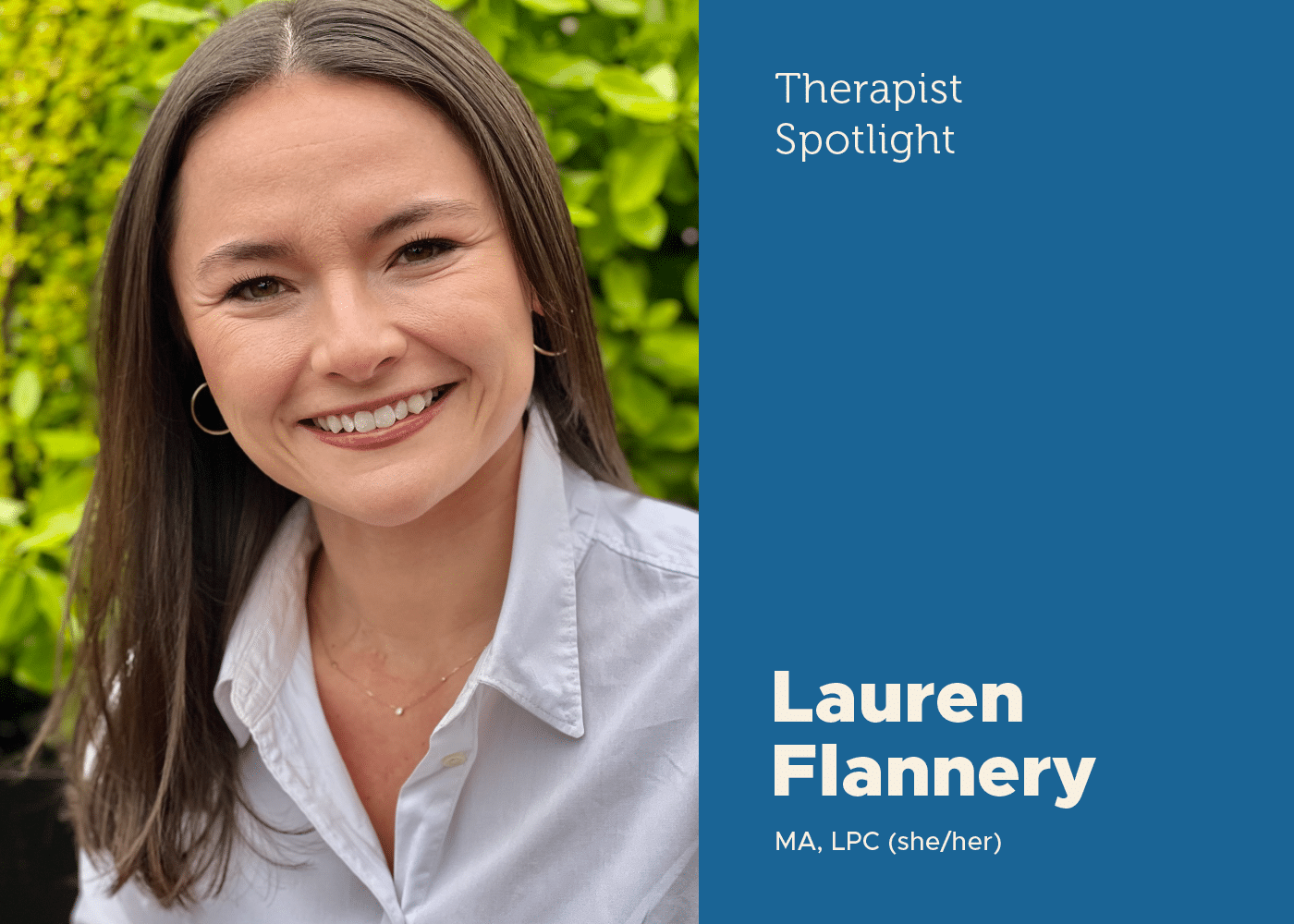Lauren (she/her) is a psychotherapist at Wildflower. Her training experience includes perinatal mood and anxiety disorders as well as trauma, anxiety, depression, grief and loss, life transitions, relationship challenges, and sports performance. Her therapeutic style is rooted in a strengths-based approach in which she utilizes evidence-based, cognitive behavioral modalities. Read Lauren’s full bio here.
What inspired you to pursue a career as a psychotherapist?
My inspiration to pursue a career in psychotherapy was many years in the making. My desire to become a helping professional began in childhood as I admired the female healthcare workers in my family. My curiosity about the specific career began in college during my first experience as a client in psychotherapy. Despite being amazed by the healing experience and knowing that I had the skill set, I resisted pursuing the career path due to fear! After years of career and personal exploration, I finally took the leap and am so grateful for the time and space I held to make this decision. What I learned along the way is that I am passionate about helping people meet their needs. Additionally, as a bi-racial woman (Filipino and Irish) I gained awareness of the gap in clinician diversity and was inspired to represent my cultural identities as a psychotherapist—representation matters!
As a psychotherapist, what part of your job is most satisfying?
As we move through life it can be hard to see growth with our own eyes and psychotherapy can help us recognize this growth. I am deeply grateful for the opportunity I have to be with clients as they experience these moments of awareness—to say that it is satisfying is an understatement!
How would you describe your therapeutic approach?
As a psychotherapist, I practice with a collaborative style utilizing evidence-based skills from cognitive behavioral modalities. Additionally, I enjoy offering compassionately challenging questions, and supporting clients through mindfully processing emotions. My goal with clients is to establish a strong therapeutic relationship as research shows that this is essential for optimal outcomes in treatment!
Why do you believe that psychotherapy can help?
Psychotherapy can help people in various ways. For some, it is a space to learn tools and skills for communication and coping. For others, it is a space for self-exploration and emotional processing. What I believe is helpful for all clients is that the relationship provides connection and encourages reflection.
What are some of your specialties and what drew you to them?
I specialize in working with the perinatal population, multicultural clients, and athletes (current or former). As I have mentioned my interests and experiences related to multiculturalism and athletics, I will highlight the many reasons that drew me to the perinatal population. From a systemic perspective, I enjoy the relief and empowerment clients experience as we challenge social “expectations” and normalize the adversities of the perinatal period. From an individual perspective, despite the loneliness and defeating feelings clients can face during the perinatal period this population displays commitment and motivation for treatment which is a delight for psychotherapists! Ultimately, what drew me to this population is my belief that parental wellness impacts society’s future generations. A quote by Anne Lamott emphasizes this belief: “The most profound thing we have to offer our own children is our own healing.”
What is one thing about psychotherapy you wish everyone knew?
Progress is not linear, meaning that sometimes you may feel worse before feeling better in psychotherapy. Many people experience disappointment or self-criticism after thinking they have “taken steps backward” in psychotherapy when they are truly experiencing the discomfort of growth!
What is your motto or personal mantra?
“Make the next play” has been my personal mantra since I began playing sports in childhood. As a collegiate athlete and coach, this mantra was a powerful tool that I utilized after making an error on the field to help me refocus. When my time in sports came to an end I found myself repeating the same mantra off the field, in my personal and professional life. These words have helped me to learn from former experiences, embrace my imperfections, and refocus on the here and now.
What are your favorite self-care activities?
I love this question because self-care looks so different for everyone! For me, self-care is made up of rest and movement. My favorite ways to rest include sitting by a fire, relaxing with a face mask, and prioritizing sleep. My favorite ways to move include dancing with friends, walking with an audiobook, and doing pilates.
![]()
Want to schedule a session with Lauren? Contact our intake team and schedule a free 15-minute consultation! Schedule a Session


